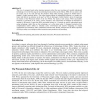Free Online Productivity Tools
i2Speak
i2Symbol
i2OCR
iTex2Img
iWeb2Print
iWeb2Shot
i2Type
iPdf2Split
iPdf2Merge
i2Bopomofo
i2Arabic
i2Style
i2Image
i2PDF
iLatex2Rtf
Sci2ools
ETS
2002
IEEE
2002
IEEE
The Wisconsin School of the Air: success story with implications
The rise of computer-based online learning represents either the most exciting and versatile educational technology ever or the first stage of an unrelenting boom and bust cycle (Cuban, 1986). It is too early to tell for certain, but as we read and hear the promises about online learning, perhaps we should listen to Saettler's (1990) prescient advice: "The most frequent failing of technological futurists is to predict the future with little or no reference to the past" (p. 538). In this paper, I follow Sattler's advice by exploring the history of the Wisconsin School of the Air (WSA). For nearly a half century, WSA successfully broadcast a curriculum of art, music, science, literature, and conservation to hundreds of thousands of students in Wisconsin. I argue that WSA succeeded because it: 1) focused on specific educational needs using technology, rather than on the technology, as is often done today; 2) designed instruction that complemented radio's ability ...
| Added | 18 Dec 2010 |
| Updated | 18 Dec 2010 |
| Type | Journal |
| Year | 2002 |
| Where | ETS |
| Authors | William Bianchi |
Comments (0)

